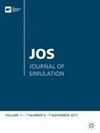A simulation-optimisation approach for production control strategies in perishable food supply chains
IF 1.3
4区 工程技术
Q4 COMPUTER SCIENCE, INTERDISCIPLINARY APPLICATIONS
引用次数: 2
Abstract
ABSTRACT In order to minimise wastes and losses in perishable Food Supply Chains (FSCs), it is crucially important to control inventory and organise the flow of material and information throughout supply chains. In this study, Basestock-Constant Work-in-Process (B-CONWIP), a pull-based inventory control policy, is proposed to control inventory in perishable FSCs. The effectiveness of the B-CONWIP policy is investigated for a three-echelon perishable FSC using a simulation-optimisation approach. The B-CONWIP policy is compared with two existing basestock policies (BSPs): continuous review (s, S) policy and BSP-low-Estimated Waste (BSP-low-EW), a periodic inventory review policy that outperforms other policies presented in the literature for perishable inventory. The objective is to minimise the total cost (i.e., sum of holding, deterioration, ordering, and shortage costs) while satisfying a predetermined service level. The study shows that B-CONWIP yields the lowest total cost, BSP-low-EW performs the second best, while (s, S) policy is the worst. It is also noted that, in spite of higher ordering cost for B-CONWIP compared to (s, S) policy and BSP-low-EW, B-CONWIP achieves the lowest total cost at all demand rate and volume variations tested. In conclusion, B-CONWIP is more flexible and robust than (s, S) and BSP-low-EW policies because of its ability to handle demand variations without major changes in control parameter values and cost measures.易腐食品供应链生产控制策略的模拟优化方法
摘要为了最大限度地减少易腐食品供应链中的浪费和损失,控制库存并组织整个供应链中材料和信息的流动至关重要。在本研究中,提出了一种基于拉动的库存控制策略——Basestock Constant Work In Process(B-CONWIP)来控制易腐FSC中的库存。使用模拟优化方法研究了三级易腐FSC的B-CONWIP策略的有效性。将B-CONWIP政策与两种现有的基本库存政策(BSP)进行比较:持续审查政策和BSP低估计废物(BSP低EW),这是一种定期库存审查政策,在易腐库存方面优于文献中提出的其他政策。目标是在满足预定服务水平的同时,将总成本(即持有、变质、订购和短缺成本的总和)降至最低。研究表明,B-CONWIP产生的总成本最低,BSP低EW表现第二好,而(s,s)策略表现最差。还应注意的是,尽管与(s,s)策略相比,B-CONWIP的订购成本更高,且BSP EW较低,但B-CONWIP在所有需求率和测试的数量变化下都实现了最低的总成本。总之,B-CONWIP比(s,s)和BSP低EW策略更灵活、更稳健,因为它能够在控制参数值和成本度量没有重大变化的情况下处理需求变化。
本文章由计算机程序翻译,如有差异,请以英文原文为准。
求助全文
约1分钟内获得全文
求助全文
来源期刊

Journal of Simulation
COMPUTER SCIENCE, INTERDISCIPLINARY APPLICATIONS-OPERATIONS RESEARCH & MANAGEMENT SCIENCE
CiteScore
5.70
自引率
16.00%
发文量
42
期刊介绍:
Journal of Simulation (JOS) aims to publish both articles and technical notes from researchers and practitioners active in the field of simulation. In JOS, the field of simulation includes the techniques, tools, methods and technologies of the application and the use of discrete-event simulation, agent-based modelling and system dynamics.
 求助内容:
求助内容: 应助结果提醒方式:
应助结果提醒方式:


